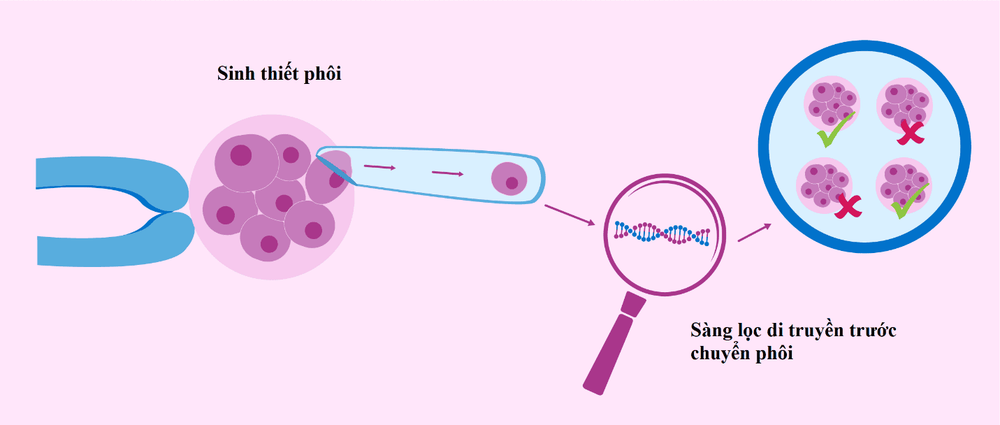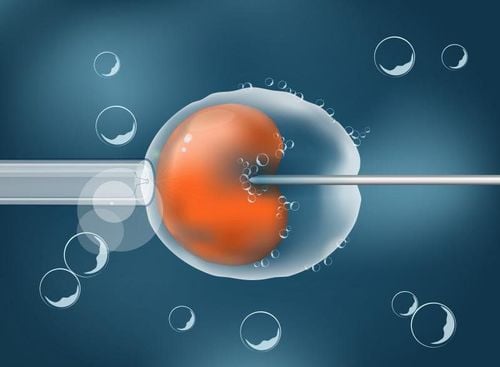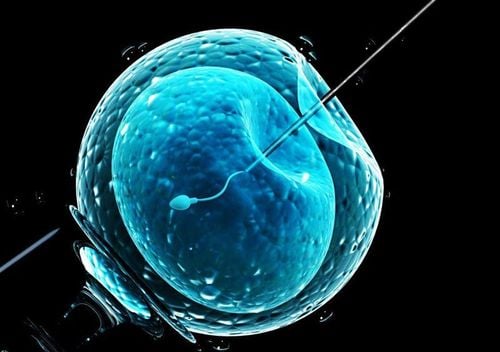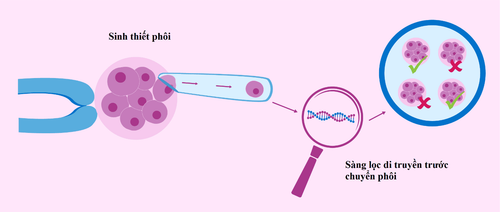This is an automatically translated article.
Article written by Doctor Do Huy Duong - Vinmec High-Tech Center
Implantation failure and early miscarriage after in vitro fertilization (IVF) are primarily caused by chromosome abnormalities. The percentage of embryos with chromosomal abnormalities increases with maternal age, reaching up to 35% in women 35 years old and can be up to 60% in women 40 years old. To solve this problem, preimplantation embryo screening technology was born to help doctors select embryos without genetic abnormalities thereby improving the success rate of IVF.
1. Advantages of preimplantation embryo screening
Before, when there was no preimplantation embryo screening technique, the selection of embryos was based only on morphology without knowing the genetic nature of the embryo. This increases the risk of in vitro fertilization (IVF) failure due to genetic abnormalities in the transferred embryos or the risk of multiple pregnancies because doctors have to transfer multiple embryos at the same time.
Preimplantation embryo screening helps to analyze the genetic nature of embryos to select morphologically and genetically normal embryos, ensuring a high probability of success, reducing the number of embryos in one transfer, reducing the rate multiple pregnancies and prevent babies from being born with genetic diseases or reduce the rate of forced termination of pregnancy due to genetic defects.
To sum up, Preimplantation embryo screening helps:
Increase implantation and IVF success rates Reduce the number of IVF attempts Increase the success rate of single embryo transfer Increase success rates in older women, especially in older women over 35 years old

Quy trình sàng lọc phôi tiền làm tổ
2. Who should be screened for preimplantation embryos?
Older women, especially over 35 years old: The risk of genetic abnormalities such as Down syndrome is proportional to the mother's age Women with multiple miscarriages: Statistics show that about 50% of miscarriages are due to abnormalities chromosome. Embryos without genetic abnormalities have a better chance of developing into healthy babies Father or mother with a chromosomal abnormality : Abnormalities in some chromosomes may not affect the embryo's development, but the This child may be born with birth defects and cognitive impairment. The PGS test detects major chromosomal abnormalities, which in turn allows for early decision making. IVF implantation failure: Certain chromosomal abnormalities reduce the ability of an embryo to implant in the uterus. Embryos with normal chromosomes have a better chance of successful implantation. Male infertility problems: Male infertility factors (including abnormalities in sperm quantity and quality) can increase the risk of chromosomal abnormalities in the embryo. PGS can assist in the identification of embryos without chromosomal abnormalities.

Khám và điều trị hiếm muộn tại Vinmec
Currently, Vinmec Times City International General Hospital is organizing the implementation of the Genetic Screening Package before embryo transfer. This is a prestigious medical address with a team of well-trained experts and technicians at home and abroad, rich in experience in the field of pre-implantation genetic screening. Vinmec has modern facilities, meeting international standards, always applying the most advanced techniques such as Microarray, new generation sequencing.
In addition, it also provides a comprehensive solution including genetic counseling before and after testing for customers. With outstanding advantages, Vinmec is currently one of the reliable hospitals for customers to choose when there is a need for genetic screening before embryo transfer.
Customers can go directly to Vinmec Times City to visit or contact hotline 0243 9743 556 for support.
References:
de Mouzon J, Goossens V, Bhattacharya S, Castilla JA, Ferraretti AP, Korsak V, et al. Assisted reproductive technology in Europe, 2006: results generated from European registers by ESHRE. Hum Reprod 2010; 25(8):1851e62 Munne S, Chen S, Colls P, Carrisi J, Zheng X, Cekleniak N, et al. Maternal age, morphology, development and chromosome abnormalities in over 6000 cleavage-stage embryos. Reprod Biomed Online 2007; 14(5):628e34 igenomix.com reproductivefacts.org MORE:
Genetic screening service before embryo transfer What is genetic screening before embryo transfer? Why does it need to be done? Modern science enables accurate lung cancer screening













